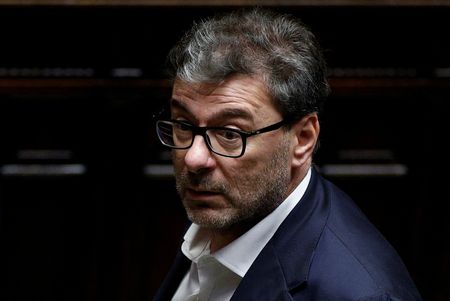By Giuseppe Fonte and Gavin Jones
ROME (Reuters) – Italy aims to follow a cautious fiscal policy in order to lower its public debt but is ready to act quickly to curb surging energy costs and head off recession risks, Economy Minister Giancarlo Giorgetti told parliament on Wednesday.
Giorgetti rejected the notion that northern European countries feared inflation while southern ones dreaded recession, saying the whole continent now risked a “nightmare” scenario in which inflation and recession went hand in hand.
The euro zone’s third largest economy grew by a stronger-than-expected 0.5% in the third quarter from the previous three months, but the Treasury forecasts contractions in the current quarter and at the start of next year.
Giorgetti, from the right-wing League party, told a panel of lawmakers the two-week-old government would pursue its budgetary policies “in a framework of prudence, aimed at enabling the reduction of the debt”.
He said its decision last week to raise the 2023 budget deficit target did not undermine the goal of reining in a debt level which stood at 150.3% of national output at the end of last year, the highest in the euro zone after Greece.
Giorgetti said the energy crisis had “completely upset” previous economic forecasts and that the 2023 budget, to be presented to parliament this month and approved by the end of the year, will be focused on containing its impact.
Soaring inflation will add 50 billion euros ($50.21 billion) to Rome’s pension bill between 2022-2025 due to automatic indexation, he estimated.
The government is ready “to intervene rapidly … to face possible recession risks,” Giorgetti said, and is examining the possibility of using unspent EU structural funds from 2014-2020 to tame gas and electricity costs for firms and families.
Energy bills will be monitored continuously at the start of 2023 and if necessary the government will take further measures reduce their impact by April, Giorgetti said.
He warned that gas prices are likely to rise in coming months as consumption increases due to colder weather.
Extra borrowing of 21 billion euros next year will be used for measures such as tax breaks for firms to help them with their fuel bills, a 5% reduction in value-added tax on gas, and energy subsidies for low-income families, Giorgetti said.
To free up resources, he said the government may curb a so-called “superbonus” incentive scheme for energy-saving home improvements which was now estimated to cost 8-10 billion euros per year more to state coffers than originally forecast.
($1 = 0.9952 euros)
(Editing by Catherine Evans)

